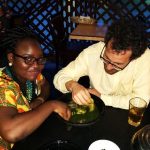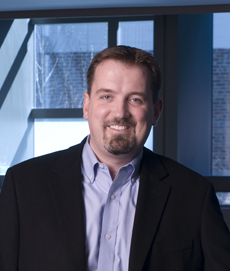The Bioengineering Department seminar series kicks off for the fall semester in one week. We hope to see you there!
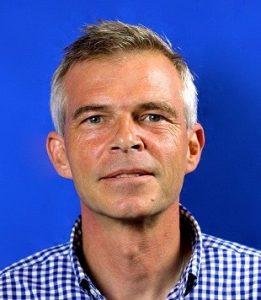
Speaker: Jens Herberholz, Ph.D.
Associate Professor, Department of Psychology, Neuroscience & Cognitive Science Graduate Program
Co-Director, Brain and Behavior Initiative (BBI)
University of Maryland College Park
Date: Thursday, October 3, 2019
Time: 12:00-1:30 pm
Location: Room 337, Towne Building
Title: “Developing Neuroengineering Solutions of Biomedical Relevance Using Crayfish as a Model System”
Abstract:
In my talk, I will first describe one of the main projects in my lab that investigates the underlying cellular-molecular mechanisms for changes in alcohol sensitivity of crayfish with different prior social experiences. In this context, I will explain why “simple” invertebrates may provide unique advantages for studying complex phenomena such as socially-dependent drug effects. Crayfish are inexpensive and easily maintained in the laboratory, and they have an accessible nervous system with large, identified neurons that link directly to behavior and can sustain many hours of experimental study. This allows for high precision and reproducibility and makes crayfish a suitable model not just for investigating neurobehavioral questions, but for developing and improving biomedical devices and tools. In the second part of my talk, I will illustrate two projects that are currently ongoing in collaboration with engineering colleagues at UMD. The first one aims to develop nanoparticles that wirelessly activate and record neural activity patterns using microwave signals. Preliminary data using individual neurons of the ex vivo crayfish nerve cord revealed that single action potentials can be robustly recorded by activating microwave signals in a nanoscale magnetic tunnel junction. The future goal of this project is to develop this technique for non-invasive monitoring and modulating of activity in brains of higher complexity. The second project interfaces the crayfish ex vivo ventral nerve cord and innervated hindgut with a multi-sensor 3D printed platform that contains cultured human gut cells and interchangeable colonies of microbiota. The physiological responses to serotonin release from cell cultures will be measured and quantified in crayfish neurons of the central and enteric nervous system and on corresponding hindgut motility with intracellular electrophysiology and motion tracking. The long-term goal is to develop a real-time, high-throughput discovery platform that allows detailed investigation of the cellular processes underlying the gut-brain axis.
Bio:
Dr. Jens Herberholz is an Associate Professor in the Psychology Department and the Director of the Neuroscience and Cognitive Science Program, an interdisciplinary, multi-departmental research and graduate training program at the University of Maryland, College Park. Dr. Herberholz received his PhD from the Technical University in Munich, Germany. His PhD work investigated the importance of mechanosensory signals during aggressive interactions in snapping shrimp. Following his PhD. he was a Postdoctoral Associate and Research Scientist at Georgia State University where he combined single-cell electrophysiology with behavioral analysis to study the neurobehavioral underpinnings of escape in crayfish. In his own laboratory, he continues to use crayfish as a primary animal model for research. Crayfish make complex behavioral decisions, and they feature an accessible nervous system with large, identifiable neurons, which allows for cellular and circuit-level analysis using neurophysiological, neuroanatomical, neurochemical, and neuroimaging techniques. His current research program focuses on identifying the structure and function of decision-making neural circuitry and understanding the interconnections between neural activity patterns and motor action in the context of aggression and predator avoidance. His most recent work addresses fundamental questions regarding the role of neurochemical inhibition, including the interplay between the neurocellular effects of alcohol and behavioral disinhibition, with the long-term goal of identifying how nervous system function is linked to adaptive and maladaptive behavioral output. Dr. Herberholz has published many peer-reviewed articles and conference abstracts as well as several book chapters on these topics; his research has been supported by the National Science Foundation (NSF), and featured by various media outlets. He is an Associate Editor for the journal “Behaviour”.

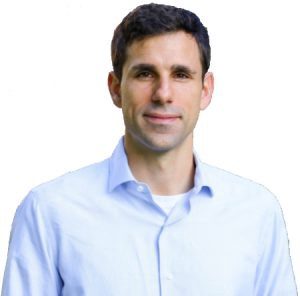
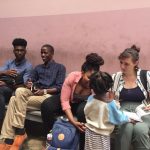
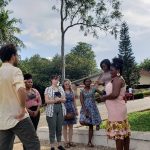
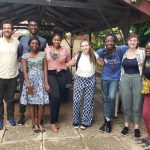 After a day inspired by Ghanaian culture we stopped for a meal at Ike’s Café. This restaurant is near the museum and we very quickly found ourselves enjoying a night full of Ghanaian delicacies to match the history we’d learned about as well as some breathtaking live music. We shared a host of local dishes which included fufu, banku, jollof, plantain, rice balls, and more.
After a day inspired by Ghanaian culture we stopped for a meal at Ike’s Café. This restaurant is near the museum and we very quickly found ourselves enjoying a night full of Ghanaian delicacies to match the history we’d learned about as well as some breathtaking live music. We shared a host of local dishes which included fufu, banku, jollof, plantain, rice balls, and more.